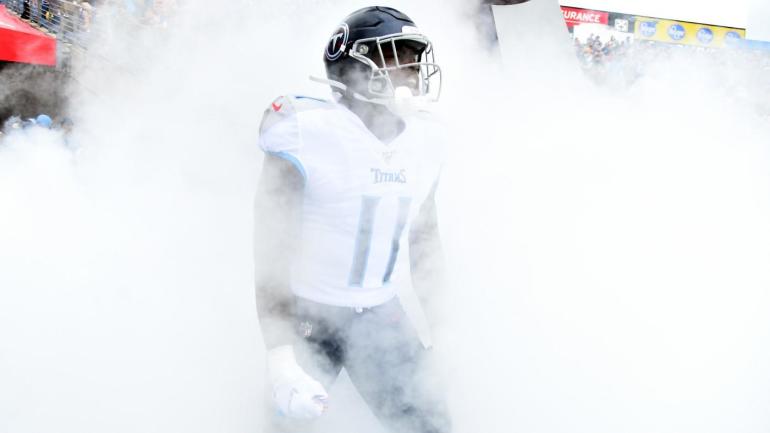
The NFL is a passing league. You know this. I know this. Everyone in and around the league knows this. And because it's a passing league, the wide receiver position has never been more important than it is right now. Perhaps it's no coincidence, then, that there are seemingly more young, good wide receivers populating the league than at any time in recent memory.
With that in mind, we've been using this space over the past few weeks to highlight some of the league's up-and-coming wideouts. Because I'm a little obsessive about this kind of stuff, we're breaking the players down into distinct categories that capture their on-field roles: Speed Demons and Deep Threats (here), Slot Mavens and Offensive Weapons (here), Possession Receivers (here), and after finally recovering some data from my old laptop, the Technicians and All-Around Monsters (below).
A couple of quick notes before we dive into the first category of players:
- The only receivers we're looking at here at players who are still on their rookie contract. That means no Davante Adams, no Julio Jones, no DeAndre Hopkins, no Keenan Allen, no Tyreek Hill, etc. We already did our in-depth look at those guys before the start of the season. While there is one player who made our top-10 list (and two who were honorable mentions) that will be featured during this series, for the most part, we are just looking at the youngsters, which means focusing on players whose future is likely brighter than their present.
- We're not exclusively looking at the best receivers, but instead all of the receivers still on their rookie deals who fit a certain mold, and have already proven to be at least nominal contributors to their offenses. Basically, anyone who has at least 15 targets this season qualifies.
Without further ado, let's dig into the technicians and monster receivers (with 2020 statistics, via Pro Football Focus and Tru Media)...
| Player | Age | Yrs | Rec | Tgt | Yds | TD | Yds/Rte | Tgt % |
|---|---|---|---|---|---|---|---|---|
| A.J. Brown | 23 | 2 | 60 | 91 | 924 | 10 | 2.45 | 24.1% |
| Chase Claypool | 22 | 1 | 57 | 92 | 772 | 8 | 1.88 | 22.4% |
| DK Metcalf | 23 | 2 | 80 | 116 | 1282 | 10 | 2.17 | 19.7% |
| Calvin Ridley | 25 | 3 | 82 | 125 | 1322 | 9 | 2.55 | 24.1% |
| D.J. Moore | 23 | 3 | 61 | 103 | 1092 | 4 | 2.19 | 20.7% |
| Jerry Jeudy | 21 | 1 | 47 | 103 | 716 | 2 | 1.51 | 21.7% |
| Justin Jefferson | 21 | 1 | 79 | 109 | 1267 | 7 | 2.60 | 22.4% |
| Terry McLaurin | 25 | 2 | 80 | 120 | 1078 | 3 | 1.91 | 21.3% |
In case it wasn't made obvious by the fact that we saved this group for last, this is (for the most part) the best group of young wide receivers. Just about all of them have shown star-caliber, No. 1 receiver upside at some point this season or last, and most of them have been stars throughout this year. You can see just how much better they've been than the other groups, pretty much across the board.
| Type | Tgt % | Rte Depth | 1st % | Expl % | YAC/Rec | Yds/Rte |
|---|---|---|---|---|---|---|
| Deep/Burner | 16.1% | 9.20 | 39.2% | 19.5% | 4.30 | 1.36 |
| Slot/Weapon | 20.5% | 6.84 | 41.1% | 16.6% | 5.12 | 1.63 |
| Possession | 20.4% | 8.41 | 42.8% | 17.9% | 4.39 | 1.74 |
| Tech/Monster | 21.9% | 9.02 | 45.5% | 22.9% | 5.06 | 2.16 |
The technicians and monsters have drawn the highest target rate, being thrown the ball on 21.9 percent of their routes run. They've run routes nearly as deep as the deep/burner types, but they've been much more efficient with their targets, creating first downs (45.5 percent to 39.2 percent) and explosive plays (22.9 percent to 19.5 percent) far more often as a percentage of their targets. They've also created nearly as many yards after the catch (5.06 per reception) as the slot mavens and offensive weapons, whose targets tend to come closer to the line of scrimmage and thus designed to pick up YAC. In the aggregate, this group of players has managed to be far motion efficient on a per-route basis than any other, generating 2.16 yards per route run.
We'll start with the exception to the rule, Jerry Jeudy of the Broncos. He has not had the best rookie season, especially when compared to other top receiver prospects like CeeDee Lamb and Justin Jefferson. Jeudy's catch rate is almost impossibly low, and it's not helped by the fact that he has dropped 11.7 percent of the passes thrown his way. Still, there are signs of a quality player lurking underneath the drops. He's averaging better than 15 yards per reception. He's created an explosive play on more than 20 percent of his targets. He's being trusted to run fairly deep routes, with an average break 8.67 yards downfield. And he is such a fantastic route-runner. He has been faking guys out of their shoes all season. (That's why he's part of the "technicians" group.) He just, ya know, needs to hang onto the damn ball.
The other players in the technician group have been significantly more effective than Jeudy. Even Terry McLaurin, who has been saddled with some of the worst quarterback play in the league both this season and last, is averaging 1.91 yards per route run, spurred by his 5.8 yards after catch per reception average. He's created explosive plays on greater than 20 percent of his targets, and he has a microscopic 2.5 percent drop rate. If the Football Team ever gets him on above-average signal-caller, he is going to absolutely explode.
D.J. Moore has been operating as the 1A option in a very crowded pass-catching group, splitting targets with both Robby Anderson and Curtis Samuel, not to mention Christian McCaffrey (when healthy) and Mike Davis. Still, he's drawn a target on 20.7 percent of his routes and, fueled by his 6.1 yards after catch per reception average, is at 17.5 yards per catch. He's been targeted further downfield this year than last, when he was in more of a possession role, and that's helped him create explosive players more often -- on 25.3 percent of his targets this year. He's 23 years old, in just his third season, and is able to move freely between the perimeter and the slot, and also to contribute in the run game on occasion. (Though the Panthers have shifted that role almost entirely to Samuel.)
Each of Ridley and Jefferson, meanwhile, should be in the mix for an All-Pro spot. Davante Adams has one of the First Team nods sewn up, but they should get heavy consideration for one of the other three wideout spots available. They've created first downs on 47.3 (Ridley) and 46.0 percent (Jefferson) of their targets, respectively, two of the highest rates in the league. Ridley has just been an absolute explosive-play monster, with 36 receptions of 16 yards or more, the top mark in the league. Jefferson has 30 of those, by the way, good for fourth behind only Ridley, Travis Kelce, and Allen Robinson. Both players have also been tasked with running incredibly deep routes, and have remained efficient despite being targeted on passes with a lower chance of being completed. Ridley's average rate has broke 10.57 yards downfield, while Jefferson's has broken 9.72 yards downfield. Among the 121 players with 50 targets or more, those figures rank fifth (Ridley) and 14th (Jefferson).
Claypool has been targeted ridiculously often, getting thrown a pass on more than 22 percent of his routes. He is an athletic marvel with otherworldly size, and he has shown the ability to win at or behind the line of scrimmage as well as down the field on deep passes. The Steelers almost never throw those, though, so he has been trusted to do a lot of his work after the catch. His 5.5 YAC per reception average shows he's up to the task, helping make up for the fact that his average route has broken only 7.51 yards downfield -- far closer to the line of scrimmage than the other players in this group. Claypool has shown enough talent to still deserve a spot here, and the fact that he is a 98th percentile athlete among NFL wide receivers bodes well for his ability to extend his skill set beyond what he's shown so far. If Pittsburgh ever decides to take advantage of his combination of size, speed, and quickness, the ceiling is very, very high.
Then there are the two former Ole Miss teammates, DK Metcalf and A.J. Brown. Metcalf's target rate has gone down a bit over the past few weeks, but he's still averaging 2.17 yards per route run, and he is one of just eight players league-wide creating a first down on more than half his targets. As big and fast as Claypool is, Metcalf might be bigger and faster, and he's already a more polished wide receiver, showing greater ability to work on the type of intermediate routes that are necessary to convert third downs and move the ball downfield. He's also moved inside to the slot more often this year than last, hinting at the terrifying possibility of him dominating smaller corners or even linebackers in the future. I shudder to think what he could do to defenses if aligned closer to the formation more often, giving him even more room to exploit his size-speed-quickness advantages.
Brown might be my favorite receiver in the league at the moment. The Titans aren't a particularly high-volume pass offense, but they're able to get away with it because they are so efficient and so explosive. Brown exemplifies both attributes. He's averaging 2.45 yards per route run. He's one of the aforementioned eight players creating a first down on at least 50 percent of his targets. He's been thrown the ball on 24.1 percent of his routes, the same rate as Ridley. He's creating big plays (20.9 percent explosive rate) and doing it by running routes fairly far down the field (9.73 yards) and picking up yards after the catch (6.6 YAC/reception). He's built like a tank at 6-foot, 226 pounds, and he both bounces off and explodes past opposing tacklers in the open field. Over the past two seasons, he has eight games with at least four receptions and at least 20 yards per reception, two more than any other NFL player despite the fact that he has missed two games this year. He's also just a remarkable touchdown producer, with 18 scores on only 112 career catches. The sky is the limit for him, and Best Receiver In Football is within the realm of possibility at some point in the next few years.

















